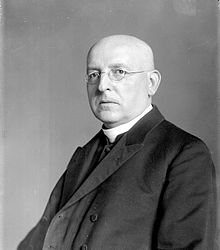Ignaz Seipel
| Ignaz Seipel | |
|---|---|
 |
|
| 4th Chancellor of Austria | |
|
In office 31 May 1922 – 20 November 1924 |
|
| President | Michael Hainisch |
| Preceded by | Johann Schober |
| Succeeded by | Rudolf Ramek |
|
In office 20 October 1926 – 4 May 1929 |
|
| President |
Michael Hainisch (1926-1928) Wilhelm Miklas (1928-1929) |
| Preceded by | Rudolf Ramek |
| Succeeded by | Ernst Streeruwitz |
| Minister of Foreign Affairs | |
|
In office 20 October 1926 – 4 May 1929 |
|
| Chancellor | himself |
| Preceded by | Rudolf Ramek |
| Succeeded by | Ernst Streeruwitz |
|
In office 30 September 1930 – 4 December 1930 |
|
| Chancellor | Carl Vaugoin |
| Preceded by | Johann Schober |
| Succeeded by | Johann Schober |
| Personal details | |
| Born |
19 July 1876 Vienna, Austria-Hungary |
| Died | 2 August 1932 (aged 56) Pernitz, Austria |
| Political party | Christian Social Party (CS) |
| Alma mater | University of Vienna |
| Profession | Theologian |
| Religion | Roman Catholic |
Ignaz Seipel (19 July 1876 – 2 August 1932) was an Austrian prelate and politician of the Christian Social Party (CS), who served as Federal Chancellor twice during the 1920s.
Seipel studied theology at the University of Vienna and was ordained a Catholic priest in 1899. He gained his doctorate in theology in 1903, followed by his habilitation at the Vienna university, being one of the first scholars writing on business ethics in the context of Catholic social teaching. From 1909 until 1917 he taught moral theology at the University of Salzburg.
Seipel was a member of the clerical conservative Christian Social Party established by the Vienna mayor Karl Lueger in 1893, and served as cabinet secretary in the Austro-Hungarian government during World War I. At that time he also wrote and published a number of famous works, including Nation und Staat (Nation and State) (1916), which helped cement his later prominent role in the party. In these writings, unlike most contemporaries swept up by Wilsonian rhetoric, he saw the state as the primary vindication of sovereignty, rather than the nation. In October 1918 he was appointed Minister for Labour and Social Affairs in the last Cisleithanian cabinet under Minister president Heinrich Lammasch.
After World War I, Seipel, a member of the constituent assembly of German Austria, re-established the formerly monarchist Christian Social Party, now operating – the empire having been lost – in the First Austrian Republic. Party chairman from 1921 until 1930, he served as chancellor between 1922 and 1924, and again from 1926 until 1929, then also as Foreign Minister.
...
Wikipedia
